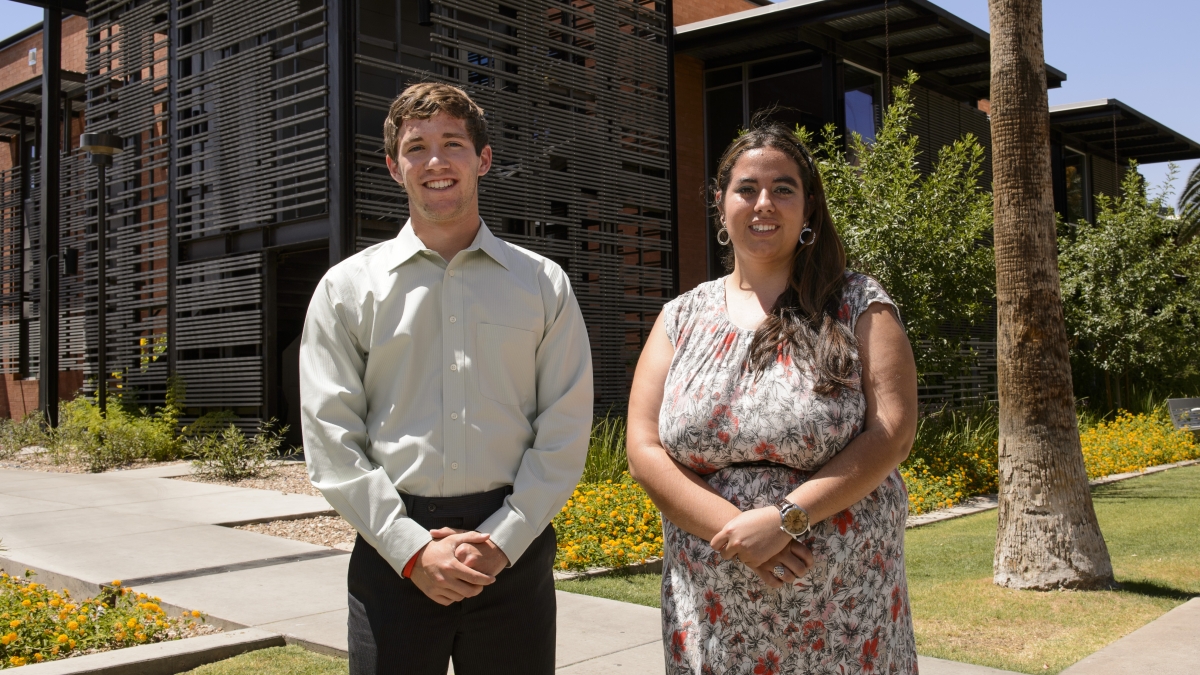Students' efforts lead Sun Devils in a healthier, tobacco-free direction

Transforming one of the largest public universities in the country into a tobacco-free institution is no easy task, but a group of Arizona State University students took on the challenge and have become the exemplars of how student advocacy can lead to the creation of a healthier learning environment.
Justin Zeien, a biochemistry junior from Tempe, and Megan Wittenberg, a kinesiology senior from Rio Rico, Ariz., have played a key role in pushing the tobacco-free initiative forward at ASU, along with their predecessors, ASU alumni Chad Williams and Courtney Roake.
Zeien and Wittenberg are members of the Health and Counseling Student Action Committee (HCSAC), a student advocacy group that acts as a liaison between the ASU student body and administration. They took over the reins of the tobacco-free campaign in 2011 after former HCSAC office bearers Williams and Roake – the first ones to set the wheels in motion for a healthier, tobacco-free university – graduated.
“We collected more than 3,300 signatures from students, faculty and staff members who supported the petition,” said Williams who now lives in Texas. “Many of those came from smokers who welcomed the move to make ASU a healthier place.”
Under the mentorship of director of ASU Health Services and HCSAC advisor Allan Markus, from 2009 through 2011 Williams and Roake toiled to bring the goal of a tobacco-free university to fruition, working with the student government and administrative leaders to raise awareness regarding the harmful effects of tobacco use. They passed the baton to Zeien and Wittenberg who continued to push for a tobacco-free university.
During a meeting in September 2012, the University Senate proposed Motion 2012-58 to discuss the adoption of a university-wide, tobacco-free policy. ASU’s Undergraduate Student Government Council of Presidents and the Staff Council had already expressed support for the policy.
Finally, the students’ efforts paid off. The University Senate approved the motion and in November 2012, ASU announced its plans of becoming a tobacco-free university beginning Aug. 1, 2013, joining more than 600 higher education institutions nationwide that are 100 percent tobacco-free.
“Rarely have I seen student initiatives that span as long as our tobacco-free university initiative,” Williams said. “This campaign speaks volumes as an example of how powerful a focused student organization can be and how ambitiously their leaders need to be thinking.”
Zeien and Wittenberg, the current president and president emeritus of HCSAC, respectively, have since concentrated their efforts on educating the Sun Devil community on the policy in the form of focus groups about the effects of tobacco on health, advocacy workshops and lectures by prominent speakers such as Assistant Surgeon General Nadine Simons of the U.S. Department of Public Health Services.
“ASU is focused on providing its community a healthier learning environment,” Zeien said. “Having a tobacco-free university not only reaffirms that goal by eliminating second-hand smoke and waste, but is also economically advantageous in terms of trash cleanup and health costs.”
Wittenberg added that being part of the student advocacy group and supporting Zeien in his efforts to lead the tobacco-free campaign has been an exceptional learning opportunity.
“The process has taught me about teamwork, leadership and working in sync with other groups within a system,” she said.
Wittenberg is now developing a project that brings together student health advocates from higher-education institutions nationwide to share ideas and best practices. She recently presented the concept at an American College Health Association conference. Additionally, she is working on creating a women's health and wellness group for ASU students.
Zeien said leading the tobacco-free campaign on behalf of HCSAC has helped him develop leadership skills and mold himself as a better candidate for medical school.
“I’ve learned how to advocate for better health which, in turn, has helped me gain internship and volunteer opportunities outside of school,” he explained. “This campaign and my time at HCSAC has helped open my mind to a bigger picture when it comes to promoting health and wellness among larger populations. Next, I hope to turn my attention to promoting mental health awareness and suicide prevention programs at ASU.”
Markus said that in addition to advocating for the policy, the students, especially Zeien, have also worked with ASU pharmacist Eric Anger to develop resources to support students who wish to quit tobacco. According to him, the work is just beginning on making the campus tobacco-free.
“We are excited about the impact this program will have on prevention of tobacco-related illnesses,” he said. “The tobacco-free campaign demonstrates our efforts to provide the healthiest environment for our students, faculty and staff members to live and learn.”